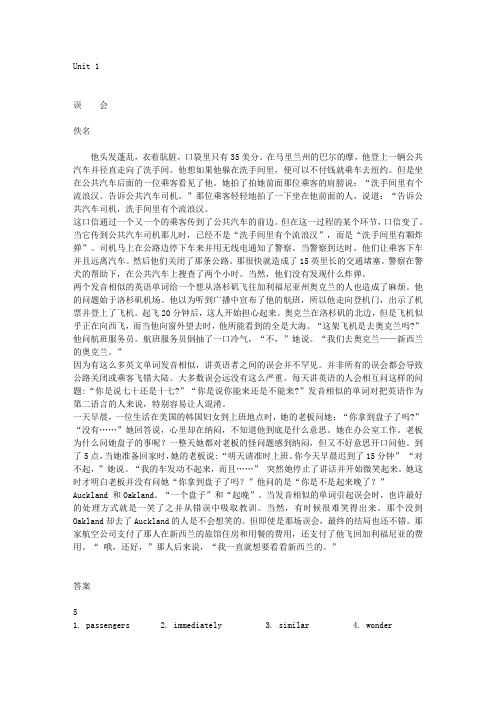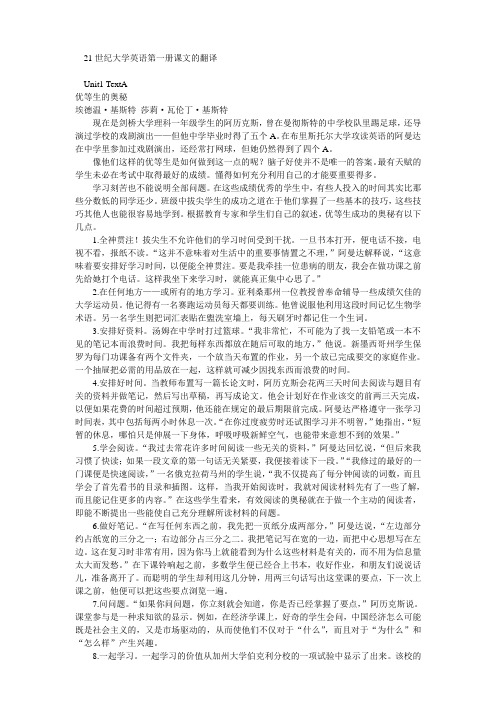21世纪大学英语(基础教程)课后翻译1~5
21世纪大学实用英语综合教程(第二册)课文翻译及课后习题答案unit-1

Unit 1误会佚名他头发蓬乱,衣着肮脏,口袋里只有35美分。
在马里兰州的巴尔的摩,他登上一辆公共汽车并径直走向了洗手间。
他想如果他躲在洗手间里,便可以不付钱就乘车去纽约。
但是坐在公共汽车后面的一位乘客看见了他。
她拍了拍她前面那位乘客的肩膀说:“洗手间里有个流浪汉。
告诉公共汽车司机。
”那位乘客轻轻地拍了一下坐在他前面的人,说道:“告诉公共汽车司机,洗手间里有个流浪汉。
这口信通过一个又一个的乘客传到了公共汽车的前边。
但在这一过程的某个环节,口信变了。
当它传到公共汽车司机那儿时,已经不是“洗手间里有个流浪汉”,而是“洗手间里有颗炸弹”。
司机马上在公路边停下车来并用无线电通知了警察。
当警察到达时,他们让乘客下车并且远离汽车。
然后他们关闭了那条公路。
那很快就造成了15英里长的交通堵塞。
警察在警犬的帮助下,在公共汽车上搜查了两个小时。
当然,他们没有发现什么炸弹。
两个发音相似的英语单词给一个想从洛杉矶飞往加利福尼亚州奥克兰的人也造成了麻烦。
他的问题始于洛杉矶机场。
他以为听到广播中宣布了他的航班,所以他走向登机门,出示了机票并登上了飞机。
起飞20分钟后,这人开始担心起来。
奥克兰在洛杉矶的北边,但是飞机似乎正在向西飞,而当他向窗外望去时,他所能看到的全是大海。
“这架飞机是去奥克兰吗?”他问航班服务员。
航班服务员倒抽了一口冷气,“不,”她说。
“我们去奥克兰——新西兰的奥克兰。
”因为有这么多英文单词发音相似,讲英语者之间的误会并不罕见。
并非所有的误会都会导致公路关闭或乘客飞错大陆。
大多数误会远没有这么严重。
每天讲英语的人会相互问这样的问题:“你是说七十还是十七?”“你是说你能来还是不能来?”发音相似的单词对把英语作为第二语言的人来说,特别容易让人混淆。
一天早晨,一位生活在美国的韩国妇女到上班地点时,她的老板问她:“你拿到盘子了吗?” “没有……”她回答说,心里却在纳闷,不知道他到底是什么意思。
她在办公室工作。
老板为什么问她盘子的事呢?一整天她都对老板的怪问题感到纳闷,但又不好意思开口问他。
21世纪大学实用英语综合教程(第三册)课文翻译及课后习题答案[1] 2
![21世纪大学实用英语综合教程(第三册)课文翻译及课后习题答案[1] 2](https://img.taocdn.com/s3/m/00f7c92d5901020207409c41.png)
21世纪大学实用英语综合教程(第三册)答案1-5(4外)Unit 11.每当我的兄弟抱怨他工作中的困难时,我总要求他看到光明的一面。
Each time my brother complained about the difficulty of his work, I asked him to look on the bright side.2.当有报告说附近大楼里两个孩子被人持枪劫持时,警察立刻做出了反应。
The police reacted immediately when report came that two kids had been held up at gunpoint in a nearby building.3.当我指出玛丽的计算错误时,他没有尽快地改正它们,却申明那不是她的错。
When I pointed out the mistakes in her calculation, instead of correcting them as soon as possible, Mary protested that it was not her fault.4.汤姆对我跟同事们说的笑话感到好奇,但他没有听懂。
Tom was curious about the joke I told my colleagues, but he didn’t get it.5.由于杰克的积极心态,在急诊室里他在失去知觉前采取了行动并且挽救了自己的生命。
Thanks to his positive attitude, Jack took action and saved his own life before he lost consciousness in the emergency room.6.当我细想我在过去所取得的成绩,我不得不说,成功来自艰苦的工作。
那是关键。
When I reflect on what I have achieved in the past, I have to say that success comes from hard work. That’s the bottom line.Unit 21.就拿迈克尔乔丹来说吧,人们很容易看到他的成就而忽视了他为使自己出类拔萃而在球场上付出的血与汗的代价。
21世纪大学英语基础教程Unit5

These people were poor and desperate, but we had absolutely no fear of them. When they knocked and asked for food, there was no concern that they might break in and steal things.
Mothers
An old Jewish proverb says, "God could not be everywhere, and therefore he made mothers." Ann Taylor expressed her emotions on the theme of mothers with the following: Who ran to help me when I fell, And would some pretty story tell, Or kiss the place to make it well? My mother.
new word s
fortunate adj. lucky 幸运的 recall v. remember 记得,回想起
二十一世纪大学实用英语(第一册)课后习题翻译

Unit 11.约翰既聪明又有责任心。
他喜欢分别人交朋友。
John is both smart and responsible. He likes to make friends with other people.2.我已经决定竞争这个新岗位。
你也可以竞争。
你自己决定吧。
I have made the decision to compete for the new post. You can compete for it, too. It‟s up to you.3.医生来后不久就设法把我父亲的病控制住了。
Shortly after the doctor came, he managed to have my father‟s illness under control.4.作为新生,我们大部分人都不知道等待着我们的大学生活会是怎样的,但是我们都知道我们必须把学习搞好。
As freshmen, most of us do not know what college life has in store for us, but we all know that we must do well in our studies.5.要在大学里取得成功,我们必须跟上其他的学生并且制定一个适合我们需要的常规。
To succeed in college, we must keep up with the other students and set up a routine that meets our needs.6.虽然上星期的作业比我想象的难,我还是按时交上去了。
Though the assignments last week turned out to be more difficult than I thought, I handed them in on time.Unit 21.你可以把信息转变成(transfer…into) 由点、划组成的密码来使它保密。
21世纪大学实用英语(综合教程)第一册Unit1-6课文翻译与课后答案

21世纪大学实用英语(综合教程)第一册Unit1-6课文翻译与课后答案21世纪大学实用英语综合教程(第一册)Unit1~6课文翻译及课后答案第一单元Text A 大学——我一生中的转折点佚名作为一名一年级新生初进大学时,我害怕自己在学业上搞不好。
我害怕独自一人在外,因为我是第一次远离家人。
这里周围都是我不认识的人,而他们也不认识我。
我得和他们交朋友,或许还得在我要学的课程上跟他们在分数上进行竞争。
他们比我更聪明吗?我跟得上他们吗?他们会接受我吗?我很快就认识到,我的生活现在就取决于我自己了。
如果我要在学业上取得成功,我就必须制定一份学习计划。
我必须调整花在学习上的时间和花在社交上的时间。
我必须决定什么时候上床睡觉,什么时候吃什么,什么时候喝什么,对什么人表示友好。
这些问题我都得自己回答。
开始时,生活有点艰难。
我在怎样利用时间上犯了错误。
我在交朋友上花的时间太多了。
我还在怎样选择大学里的第一批朋友上犯了一些错误。
然而不久,我就控制住了自己的生活。
我做到了按时上课,完成并交上了第一批作业,而且以相当好的成绩通过了前几次考试。
此外,我还交了一些朋友,跟他们在一起我感到很自在,我能把我担心的事告诉他们。
我建立了一种真正属于我自己的常规——一种满足了我的需要的常规。
结果,我开始从一个不同的视角看待我自己了。
我开始把自己看作是一个对自己负责也对朋友和家人负责的人。
凡事自己做决定并看到这些决定最终证明是明智的决定,这种感觉很好。
我猜想这就是人们所说的“成长”的一部分吧。
我未来的生活将会怎样呢?在人生的这一阶段,我真的不能确定我的人生之路最终将会走向何方,我真的不知道在以后的几年中我会做什么。
但我知道,我能应对未来,因为我已经成功地跃过了我生命中的这一重要障碍:我已经完成了从一个依赖家人给予感情支持的人向一个对自己负责的人的过渡。
Practice 51. smart2. succeed3. shortly4. managed5. share6. fear7. responsible 8. however 9. enter 10. surrounded 11. handle 12. comfortablePractice 61. is up to2. keep up with3. under control4. at first5. grew up6. make friends with7. turned out8. as a result9. set up 10. in additionPractice 71. how to play the game2. whereI wanted to go3. whether they would accept him or not4. what to do and how to do it5. whom to love and whom not to6. when he made that decisionPractice 81. I see Li Ming as my best friend. We share the same hobbies and interests.2. They looked upon their math teacher as their best teacher.3. We think of this place as our home.4. They looked on their college life as their happiest years in their life.Practice 91. John is both smart and responsible. He likes to make friends with other people.2. I have made the decision to compete for the new post. You can compete for it, too.3. Shortly after the doctor came, he managed to have my father’s illness under control.4. As freshmen, most of us do not know what college life has in store for us, but we all know that we must do well in our studies.5. To succeed in college, we must keep up with the other students and set up a routine thatmeets out needs.6. Though the assignments last week turned out to be more difficult than I thought, I handed them in on time.Text B 我希望从大学教育中得到什么亚历克西斯·沃尔顿中学毕业后,我计划做几件事。
最新21世纪大学英语课文翻译unit1资料

Unit 1 Book 3Do you remember your first love? All those exciting and wonderful new emotions – the way your heart raced when that special person was near –those anxious, awkward moments when you didn't know what to say or do? And then (for most of us) that sad moment when for one reason or another it all came to an end … Ernest Hemingway once said, "Every love story ends as a tragedy" – but the authors of the texts in this unit have a different point of view. Text A focuses on the unexpected side effects of the author's first venture into romance, while Text B recalls the ups and downs of the author's great love for … his car! Finally, the authors of Text C offer some fascinating advice about how to successfully navigate romantic relationships.Text A How I Got SmartA common misconception amongyoungsters attending school is that theirteachers were child prodigies. Who else but abookworm, with none of the normal kid'stendency to play rather than study, wouldgrow up to be a teacher anyway?I've tried desperately to explain to my students that the image they have of me as an enthusiastic devotee of books and homework during my adolescence was a bit out of focus. On the contrary, I hated compulsory education with a passion. I could never quite accept the notion of having to go to school while the fish were biting.But in my sophomore year, something beautiful and exciting happened. Cupid aimed his arrow and struck me right in the heart. All at once, I enjoyed going to school, if only to gaze at the lovely face in English II.My princess sat near the pencil sharpener, and that year I ground up enough pencils to fuel a campfire. Alas, Debbie was far beyond my wildest dreams. We were separated not only by five rows of desks, but by about 50 I.Q. points. She was the top student in English II, the apple of Mrs. Larrivee's eye.Occasionally, Debbie would catch me staring at her, and she would flash a smile that radiated intelligence and quickened my heartbeat. It was a smile that signaled hope and made me temporarily forget the intellectual gulf that separated us.I schemed desperately to bridge that gulf. Andone day, as I was passing the supermarket, an ideacame to me. A sign in the window announced thatthe store was offering the first volume of a set ofencyclopedias at the special price of 29 cents. Theremaining volumes would cost $2.49 each.I purchased Volume I -- Aardvark to Asteroid -- and began my venture into the world of knowledge. I would henceforth become a seeker of facts. I would become Chief Brain in English II and sweepmy princess off her feet with a surge of erudition.I had it all planned.My first opportunity came one day in thecafeteria line. I looked behind me and there shewas.“Hi,” she sai d.After a pause, I wet my lips and said, “Know where anchovies come from?”She seemed surprised. “No, I don't.”I breathed a sigh of relief. “The anchovy lives in salt water and is rarely found in fresh water.” I had to talk fast, so that I co uld get all the facts in before we reached the cash register. “Fishermen catch anchovies in the Mediterranean Sea and along the Atlantic coast near Spain and Portugal.”“How fascinating,” said Debbie, shaking her head in disbelief. It wasobvious that I had made quite an impression.A few days later, during a fire drill, I casuallywent up to her and asked, “Ever been to theAleutian Islands?”“Never have,” she replied.“Might be a nice place to visit, but I certainly wouldn't want to live there,” I said.“Why not?” said Debbie, playing right into my hands.“Well, the climate is forbidding. There are no trees on any of the 100 or more islands in the group. The ground is rocky and very little plant life can grow on it.”“I don't think I'd even care to visit,” she said.The fire drill was over and we began to file into the building, so I had to step it up to get the natives in. “The Aleuts are short and sturdy and have dark skin and black hair. They live on fish, and they trap blue foxes and seals for their valuable fur.”Debbie's eyes widened in amazement.One day I was browsing through the library. Ispotted Debbie sitting at a table, absorbed in acrossword puzzle. She was frowning, apparentlystumped on a word. I leaned over and asked if I couldhelp.“Four-letter word for Oriental female servant,” Debbie said.“Try amah,” I said, quick as a flash.Debbie filled in the blanks, then turned to stare at me in amazement. “I don't believe it,” she said. “I just don't believe it.”And so it went, that glorious, joyous, romantic sophomore year. Debbie seemed to relish our little conversations and hung on my every word.Naturally, the more I read, the more my confidencegrew.In the classroom, too, I was gradually making mypresence felt. One day, during a discussion ofColeridge's “The Ancient Mariner”, we came across theword albatross.“Can anyone tell us what an albatross is?” asked Mrs. Larrivee.My hand shot up. “The albatross is a large bi rd that lives mostly in the ocean regions below the equator, but may be found in the north Pacific as well. The albatross measures as long as four feet and has the greatest wingspread of any bird. It feeds on fish and shellfish. The albatross has an enormo us appetite, and when it's full it has trouble getting into the air again.”There was a long silence in the room. Mrs. Larrivee couldn't quite believe what she had just heard. I sneaked a look at Debbie and gave her a big wink.She beamed proudly and winked back.What I failed to perceive was that Debbie all thiswhile was going steady with a junior from aneighboring school -- a basketball player with a C+average. The revelation hit me hard, and for a while Ifelt like forgetting everything I had learned. I had savedenough money to buy Volume II --Asthma to Bullfinch-- but was strongly tempted to invest in a basketball instead.I felt not only hurt, but betrayed. Like Agamemnon, but with less drasticconsequences, thank God.In time I recovered from my wounds. The next yearDebbie moved from the neighborhood and transferred toanother school. Soon she became no more than a memory.Although the original incentive was gone, I continuedporing over the encyclopedias, as well as an increasing number of other books. Having tasted of the wine of knowledge, I could not now alter my course. For:“A little knowledge is a dangerous thing:Drink deep, or taste not the Pierian spring.”So wrote Alexander Pope, Volume XIV -- Paprika to Pterodactyl.斯蒂夫· 普罗迪上学的孩子们中间有一种普遍的错误想法,即认为他们的老师当年都是些神童。
21世纪大学英语读写教程第一册课后翻译

第一册Unit 11. 汤姆是个非常好奇的男孩,他不仅对“是什么”感兴趣,而且也对“为什么”和“怎么会”感兴趣。
As a very curious boy, Tom is interested not only in whats but also in whys and hows.2. 据史密斯教授说,幸福就是你能充分利用你所有的一切。
Happiness, according to Prof. Smith, is the ability to make the most of what you have.3.你最好把这本书放在你15岁儿子找不到的地方。
You’d better keep the book where your 15-year-old son can’t get his hands on it.4. 这故事非常滑稽,比尔一边读一边不停地笑。
The story was so funny that Bill kept laughing all the time while reading it.5. 成绩优秀的学生未必比他们得分较低的同学在学习上花费更多的时间。
High-achieving students do not necessarily put in more time on their studies than their lower-scoring classmates.6. 你是怎样设法说服这些学生修读快速阅读课的?How did you manage to persuade these students to take the speed-reading course?7. 用功是重要的,但知道如何充分利用自己的才能更重要得多。
Working hard is important, but knowing how to make the most of one’s abilities counts for much more.8. 她要求学生独立思考,而不是告诉他们该思考什么。
21世纪大学英语第一册课文的翻译

21世纪大学英语第一册课文的翻译Unit1 TextA优等生的奥秘埃德温·基斯特莎莉·瓦伦丁·基斯特现在是剑桥大学理科一年级学生的阿历克斯,曾在曼彻斯特的中学校队里踢足球,还导演过学校的戏剧演出——但他中学毕业时得了五个A。
在布里斯托尔大学攻读英语的阿曼达在中学里参加过戏剧演出,还经常打网球,但她仍然得到了四个A。
像他们这样的优等生是如何做到这一点的呢?脑子好使并不是唯一的答案。
最有天赋的学生未必在考试中取得最好的成绩。
懂得如何充分利用自己的才能要重要得多。
学习刻苦也不能说明全部问题。
在这些成绩优秀的学生中,有些人投入的时间其实比那些分数低的同学还少。
班级中拔尖学生的成功之道在于他们掌握了一些基本的技巧,这些技巧其他人也能很容易地学到。
根据教育专家和学生们自己的叙述,优等生成功的奥秘有以下几点。
1.全神贯注!拔尖生不允许他们的学习时间受到干扰。
一旦书本打开,便电话不接,电视不看,报纸不读。
“这并不意味着对生活中的重要事情置之不理,”阿曼达解释说,“这意味着要安排好学习时间,以便能全神贯注。
要是我牵挂一位患病的朋友,我会在做功课之前先给她打个电话。
这样我坐下来学习时,就能真正集中心思了。
”2.在任何地方——或所有的地方学习。
亚利桑那州一位教授曾奉命辅导一些成绩欠佳的大学运动员。
他记得有一名赛跑运动员每天都要训练。
他曾说服他利用这段时间记忆生物学术语。
另一名学生则把词汇表贴在盥洗室墙上,每天刷牙时都记住一个生词。
3.安排好资料。
汤姆在中学时打过篮球。
“我非常忙,不可能为了找一支铅笔或一本不见的笔记本而浪费时间。
我把每样东西都放在随后可取的地方,”他说。
新墨西哥州学生保罗为每门功课备有两个文件夹,一个放当天布置的作业,另一个放已完成要交的家庭作业。
一个抽屉把必需的用品放在一起,这样就可减少因找东西而浪费的时间。
4.安排好时间。
当教师布置写一篇长论文时,阿历克斯会花两三天时间去阅读与题目有关的资料并做笔记,然后写出草稿,再写成论文。
